- Home
- Giles Foden
1999 - Ladysmith Page 27
1999 - Ladysmith Read online
Page 27
There was nothing for it but to try to work the flank of the hill on the other side of the open country, where—through his burning eyes—he could see the night outline of some thorn trees poking up at the top of the ridge. He began to move swiftly towards them, expecting at every moment to feel the burn of a bullet in his back or shoulder. He had a vague idea where he was, that if only he could get over the ridge, the British lines would be within sight. He had almost reached it when another shot rang out.
Realizing they must have started following him already, he dropped down and started to wriggle forward on his stomach. Just a few hundred yards to go. He squirmed like a reptile, all the time the coarse grass rubbing against his trousers and the wound beneath.
Behind him, he heard faint voices, and then the bark of a dog. He tried to speed up. The bombardment had stopped now, and the clouds of smoke were thinning out. By the hoe of Shaka, his eyes hurt. Surely the moonlight would show him full now. He had only a few minutes left. Forward a bit more in his snake track. The trees were above him now; he reached out and scrabbled with his hand, pulling himself up. Now he could grasp a root. He pulled again. Then he turned on his side and looked round. Appearing and disappearing in the blackness were the flames of torches, a straggly line of fire-spots. But they were not coming in his direction. He had made the right choice. They were going up the donga. He released a sigh from his lungs and stood up. Stumbling, he made his way through the mimosa thicket. The thorns tore at his sides, and every now and then he stopped and raised his hands to his eyes. They felt thick, gummy. When he got to the other side of the trees, he looked out over a series of undulating ridges and saw, through his swollen lids, the lights of Ladysmith, two or three miles away. Between lay various smaller Boer outposts and batteries, blocking his way.
Around him, another light—the generous, dangerous moon of Natal—illuminated patches of ground. He picked out the stripe of a path coming up from the town, passing between the circular shapes of the British defences, and suitably obscured from the Boer outposts by hills. He crawled down towards it, collecting up stones as he went, pulling out his shirt and using it as a pouch in which to carry them.
When he got to the edge of the path, he crouched down and started making a pile of stones. Not enough. He went back and picked up more, until the pile was knee-high. To the innocent eye, it looked like nothing, indistinguishable from any of the other cairns that dotted the slopes above the town. To his eye, though—and, he hoped, that of another—it was a clear sign written on the ground. A letter.
He retreated to the trees and, finding a small area free from roots, opened the bundle. He laid the cloth on the ground and spread out the contents upon it: water canteen, knife, and a small packet. He took the knife and began to scrape a hole in the ground. It seemed to take an age, but after a while he had made enough of a depression to hide most of his body. He broke off some branches and, using strips of bark to bind them together, made a cover for the hole, stuffing leaves into the bindings to complete the camouflage. Then, exhausted, he crawled inside his burrow, pulling the lid down on top of him. His wound was throbbing—it felt warm, as if a coal had been placed in a cavity beneath the soft, fresh-healed skin—and he was hungry. He took the packet out of the bundle, undid it, and felt something rough, like tree bark. Biltong, dried meat. Mabunu food. Boer food. He lifted it to his mouth and tore off a piece. It was extremely tough, taking a long rime to soften.
Fourty-Four
Time passed. Time grew, the roots of trees sending out bright green suckers into people’s bomb-proof shelters. And time, like the ever-decreasing bundles of forage the Green Horse spread out each day on the parade ground, rotted. Tom felt he was rotting too, the lack of purpose fermenting inside him. He hated being on guard duty at the prison; it was a lowly activity for a soldier. He wished he wasn’t there. More than anything, he wished he hadn’t got caught up in the business with Bella and the Portuguese prisoner. When he was off-duty, he had gone down to the tunnels to see her, but on being fetched out by an old woman she had simply given him a hard look and marched back inside her cave without a word.
Without: that was the word which pressed down on his mind. Without meat (how fondly he remembered those days at home, pulling ribs of tender yearling from the pickle tub), without the physical comfort of a woman (the memory of his encounter with Bella in the orchard, too, played through his mind, at once arousing and depressing him), without drink, without tobacco. Without, also, in another sense, the Boers. By Christ, how would it end, when would it end? If someone had said to him in November that he would still be shut up here in February, he would have laughed. The mutter of Buller’s guns on the Tugela, now clearly audible, merely emphasized the deadlock in which they were fixed: news of the British defeat at Spion Kop had made everybody very miserable, and they were all as likely to imagine the distant thunder as being the fire of a retreating army as that of an advancing one. The messages coming through from Buller’s heliograph had—from the point of view of a hungry, dispirited garrison—descended to a quite unbelievable level of banality and uselessness, one reading, ‘Sir Stafford Northcote, Governor of Bombay, has been made a peer’.
Apart from dreaming about Bella’s soft white hands, Tom concerned himself, as he sat on a milking stool outside the Dopper Church guardhouse, with the identity of the spy out of whose hands he had shot the looking-glass. In spite of his arrest, he was pretty certain it wasn’t the Portugee: all the boots at his ruined shop and living quarters had been checked, and none of them printed the tell-tale V-sign. Whenever he was on his way from Green Horse Valley to the church, he looked out for it in the dust of the street; but he never saw it. It was just the same as everything else in the town. Nothing happened, nothing except shells, sunstroke and dysentery—and the constant craving for tobacco, which seemed to take on great, almost philosophical proportions in that place. There was a shortage, but there were also secret stocks. A black market had grown up—especially in the pungent Dutch shag, which could be sweetened with peach blossom. There were also those among the Indian and other merchants who made a small fortune by rerolling the fragments from cigar butts picked up around the town, and then selling the secondhand article in their shops.
It was while buying an ounce of plug tobacco at such a shop, one evening before going on duty at the church, that Tom saw her: not Bella (although she had continued to occupy his thoughts) but a coffee-coloured woman with beads round her neck and long coils of dark hair. She was a Cape Malay, a descendant of one of the indentured labourers brought to South Africa by the Dutch. Her father, seeing Tom look at her in the murky room beyond the counter, grinned toothlessly from under his red fez and made a sign with his head, jerking it back towards her with a suggestive look. Tom glanced at the woman again. She was wearing a light shift, printed with swirling patterns of blue and orange. In the semi-darkness, her eyes—larger and more oval than those of Europeans—looked back at him impassively.
The shopkeeper lifted up the flap in the counter and Tom—forced to heft his rifle awkwardly in order to fit through the gap—went through into the dimly lit room. The place smelt of patchouli, and the low flame of an oil lamp guttered in a corner, giving off a smoky light. The woman smiled at him, and then went over to the bed and lay down. She had a large number of bangles on her arm, made of horn and metal.
Tom cleared his throat. “How much?”
The woman shook her head—which he took to mean that she did not understand English—and, sitting up on the bed, held up the fingers of both hands. Ten shillings. He had enough: it was cheaper than the tobacco, at any rate, which had cost him twenty-five shillings. He calculated that at the usurious rate of exchange that obtained in Ladysmith, this woman’s body would cost him no more than he could expect to pay for three-quarters of a pound of sugar.
He stood there for a second, not knowing what to do. Finally he unhitched his rifle, took off his helmet, and started to undo the buttons of his tunic. As he was doing so,
the woman pulled her shift over her head, the bangles sliding down her arm with a clanking sound. Tom looked at her bared, pointed breasts, and then clumsily lifted up his right foot to undo the laces of his boot; as he did so, he nearly lost his balance, and the woman made a noise something like a laugh and got up out of the bed. Coming over to him, she knelt down on the floor and began to unlace his boots, holding the leg with one hand as she pulled at the heel with the other. Tom looked down at her bent back beneath him, the bones of her spine pressing out through the caramel flesh like the keys of a musical instrument.
She put her hands flat against his thighs, rubbing her palms against them in slow, circular movements. He felt himself grow hard, and looked down through the gloom at the woman’s hair streaming down her back, at the smooth groove between her buttocks and the sharply defined muscles of her calves, which tapered out towards feet folded flat against the floor. Her soles were face up, skin reflecting the lamplight in feathery creases.
She began to undo his breeches. As she tugged them down, his eye was caught by his boots lying on the floor to either side of her—tipped over, their tongues and laces falling out around them. There was something fascinating about those boots of his, or so it seemed, and as the Malay woman released him from his underclothes, he stared at them dumbly. Still kneeling, the woman reached an arm between his thighs and started caressing his buttocks. Her cheek, the whole side of her face, was laid against his hip, and as she moved her hair brushed against him, making him shudder with pleasure. His hands felt trembly and useless, so he put them on her shoulders; but then she made a slight disapproving sound and stood up, dragging her breasts against his stomach, until she was face to face with him. She moved closer until, almost imperceptibly at first, a soft warm hood of flesh began to press itself over the tip of him. He gasped.
At this she laughed softly, and immediately uncoupled herself. She turned around and—holding his prick as if it were the bridle of a horse—led him over to the bed. They lay down next to each other, he flat on his back and she up on one arm, stroking his chest and stomach with her free hand. Her hair and breasts hung down near his face, the dark nipple of the nearest breast touching his cheek. After a while, she pushed back her hair over her ear, leant down over him, and took his crown between her lips. For a while she was motionless, except for fluttering her tongue upon him a little. Then she took the root of him in her hand and began to move her head slowly up and down. When she pulled his shaft tight with her hand, he had to stop a groan in his throat, conscious that the shopkeeper was not far away. Looking up at the ceiling of the room, which was spotted with dark marks and blotches, he was just beginning to feel a warm, rising sensation in his balls when she stopped, climbed on top of him, and drew him into her.
She started to move, and he groaned again and gripped her hipbones. In response, she stopped and waited, immobile except for the slightest pulse. As she did this, she looked down into his face with mocking eyes. He had to look away, concentrating on the dark shape of his rifle, propped up against the wall. Soon, when he was calmer, she put her hands on his chest and started to move again. She used her hands as levers to get the rhythm; and then the rhythm got him, the tempo increasing until, helpless, he closed his eyes and unloaded himself deep inside her.
Fourty-Five
“Come on,” shouted the Biographer, “come on in.”
Naked, Perry Barnes hovered on a pale sandbank at the edge of the Tugela, and then jumped.
The Biographer approached him like a greedy crocodile. “Now I can touch your fudge-box,” he murmured lasciviously.
Once, unobserved under the cover of the river’s silvery surface, they had finished (for they had been lovers for weeks) and the Biographer had frigged him off under the water—Perry’s white string, seed of his forefathers, floating off downstream to God knew where. Afterwards, they got out and towelled themselves down.
The two men walked back to camp in silence, glowing with shame and the after-warmth of pleasure. The Biographer smoked a cigar.
Then Perry said, “If I get potted…when you get into Ladysmith, tell Tom he was a good brother.”
“Don’t be silly,” said the Biographer. “You’ll be able to tell him that yourself, when you see him.”
Fourty-Six
Each eye had its own vision, thought Nandi, but some eyes saw nothing at all. To be specific, white eyes. They did not see that all this digging and cleaning of latrines to which she had been put by the military might be beneath her. It was simply kafferwerk, her natural lot, this carrying of shit and earth, sometimes with her bare hands. It amazed her the extent to which the whites failed to see her as human. It was not even that they thought her nearer to the beasts, the oxen and mules; it was that they failed even to see her at all. To them, all blacks were invisible, and silent too. The truth, of course, was that the voices of all her people were as noisy as the shells which, even now, screamed in the air above her; it was just that the whites did not understand the language. Not Zulu or Xhosa—she meant something deeper than that: the blackness which shut like prison bars.
Another shell went over. It had grown dark now, and she could see the orange mark the shell made in the sky. She just shrugged now when the bombs came; whereas earlier, like everyone else, she had crouched and cringed. Now it was all simply part of the routine. No shelling—that would have been extraordinary, that would have broken the pattern of events. But in Ladysmith now, with the siege in its one hundred and tenth day, the routine was as set and fixed as the passage of the earth round the sun.
And yet, that day, a strange thing had happened. The young mama, Miss Bella, had come up from the tunnels to the small shack she and Wellington had built in the ruined garden behind the Royal (the original servants’ quarters having been hit) and asked for their help. She had never known anything like it before. Wellington had not been there, and it had been to him in particular that the young mama had wanted to talk. He had been out beyond the lines, checking for heaps of stones, for isivivane. According to her son, Muhle had made some pledge about meeting him by one—but to her own mind, in spite of missing her husband terribly, it would be better if Wellington did not go outside the perimeter, as he put his life in danger each time he did. He had now stopped going on missions for the white men, and spent all the time scouring the hills and the plain for his father.
A kind of mania about this had come over him, and it was all she could do to prevent him from spending all day and night out there. At least the young mama’s suggestion (for which she had already made a payment) kept Wellington in the town, even if it did seem dangerous enough in itself. She would tell him about it when he came back, and send him down to see Miss Bella at the tunnels. Nandi, who had once taken some food down there on Mr Kiernan’s instructions, was glad she didn’t have to go herself. The holes by the Klip made her think of the umgodi, the mine shafts on the Rand—and those she associated with death, only death. Whatever happened, after all this, she would rather cut her wrists than go back there.
She heard a noise, and looking out of the shack, saw Wellington appear in black silhouette, standing out against a vague red glow of shellfire. When he came in, she told him what the young mama had said. He went immediately down to the tunnels to meet with Miss Bella. All that night Nandi Maseku lay awake, smoking her second-best pipe.
Across town, in the hospital, Nevinson too lay awake, waiting for his dose of morphia. That, and douching his head with boiling hot water, were the only ways of easing the pain in his skull, which seemed to have swelled to the size of a football. He craved the needle like a lover. Aping Chatterton, he dangled his arm from the bed. Chatterton the poet-forger, whose supposititious verses were attacked by another, eighteenth-century George Steevens. Was the scholar an ancestor of his departed friend? He’d never had time to ask.
A gowned figure glided over. The nurse’s cool fingers plucked up the flesh of his arm; the prick was over before he felt it; and he waited for the vial’s brown liquid to
do its magic. Afterwards, once the warm feeling had flooded through him, he felt unassailable. Nothing in the world was evil, everything was possible, and all lived happily in joyous anarchistic communities. He heard a voice, and seemed to see a white light above him.
Fourty-Seven
Above him, Torres saw the dark roof of the church. He could feel something worrying at his shoulder, pulling at his shirtsleeve. He looked down and saw a thin black face.
“Get dressed, nkosi,” the face said. “We go.”
Torres looked around; everyone was asleep.
“What’s happening?” he whispered back.
“Do it quick please, nkosi, mama waits outside. She says you are to escape.”
The barber dragged on his clothes quickly and followed the boy to the vestry. Its door creaked awfully, and in front of him Torres heard the boy catch his breath. Once they were inside, the boy lifted away the iron grille that covered the window. It was clear that he had undone the screws from the outside, and then replaced the grille loosely after he himself had climbed in. Now he motioned that the barber should climb up out of the window. Torres looked at him askance: the gap was narrow, and to go through it presented a hazard of the sharpest character. But then he thought of all the long days he had spent locked up in the place, and the ever-present threat of being shot by the British on a cooked-up charge. With these thoughts in mind, he lifted himself up and poked his head out of the window. The moon shone brightly over the yard, but the eastern fence was in shadow. That must have been where the boy came in. Holding on to the window-frame, he put first one leg out and then the other. Then, with some difficulty, he manoeuvred himself through the gap, the iron frame scraping his back. Falling awkwardly to the ground, he looked over to the sentry’s hut, just twenty yards away, and saw that he would be plainly visible if the man sitting outside happened to look.

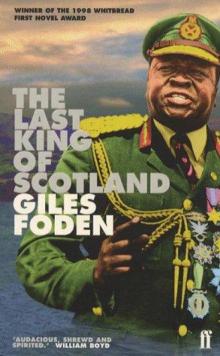 The Last King of Scotland (1998)
The Last King of Scotland (1998) Zanzibar
Zanzibar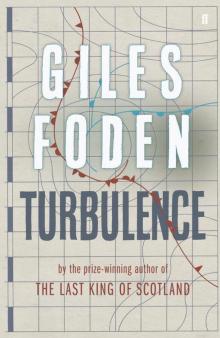 Turbulence
Turbulence The Last King of Scotland
The Last King of Scotland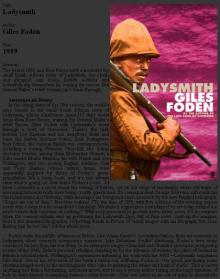 1999 - Ladysmith
1999 - Ladysmith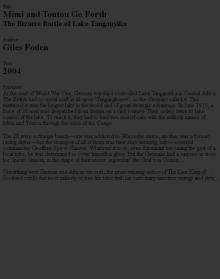 2004 - Mimi and Toutou Go Forth
2004 - Mimi and Toutou Go Forth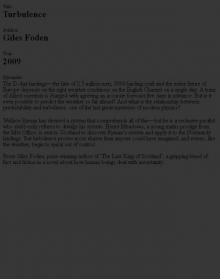 2009 - Turbulence
2009 - Turbulence